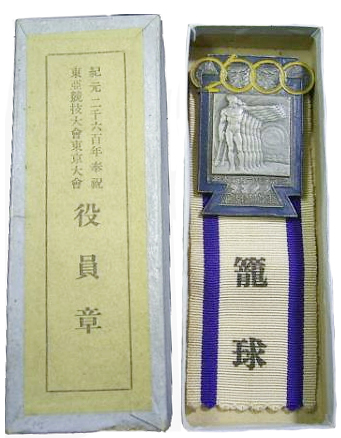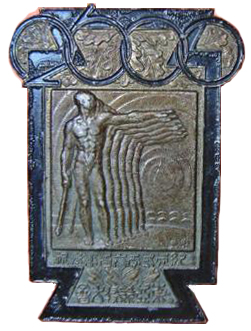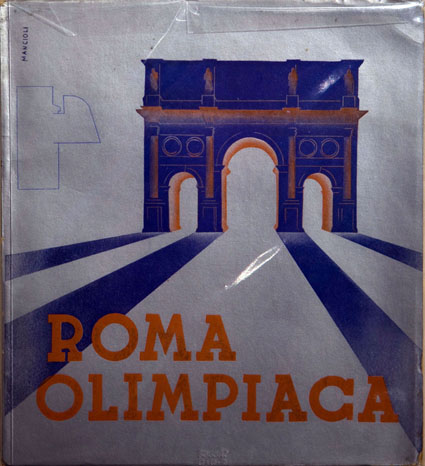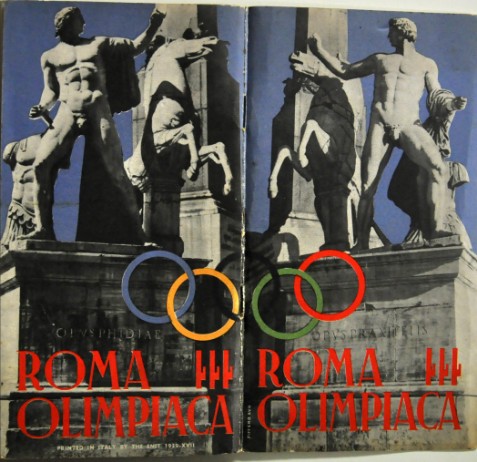ROMA 1924-1936-1940

I distintivi fatti coniare dal Giappone per i 2600 anni dell'Impero.
Badges minted by Japan for the 2600th anniversary of the Empire.
Badges minted by Japan for the 2600th anniversary of the Empire.

Roma ritornò a chiedere i Giochi Olimpici del 1924, sfidando la concorrenza di Amsterdam, Barcellona, Los Angeles, Praga e Parigi. Ma a causa di quello che era accaduto venti anni prima, i Membri del CIO non si fidarono della candidatura della capitale d'Italia, e scelsero Parigi.
Il terzo tentativo romano riguarda i Giochi del 1936, che Berlino si aggiudicò, superando Roma ed altre dieci città candidate.
E così, mentre la seconda guerra mondiale era ormai alle porte, il regime decise di candidare la città di Roma per le Olimpiadi del 1940, che avrebbero dovuto affiancarsi all’Esposizione Universale (pensata come grande celebrazione dei fasti e dei successi del fascismo), prevista per il 1941. Jigoro Kano, Presidente del Comitato Organizzatore per la candidatura di Tokyo 1940, durante una riunione del suo Comitato, sostenne che “Mussolini é un grande uomo ed ha una cordiale comprensione per il nostro paese e i suoi interessi” e “Se Mussolini fosse avvicinato nella giusta maniera, porterebbe la propria influenza in favore del Giappone rinunciando alla candidatura italiana”. Al di là della valutazione su Mussolini, Jigoro Kano vede giusto e infatti nel 1935 la previsione si avvera. La scusa ufficiale é che nel 1940 ricorre il 2600° anno dell’impero giapponese, di fatto sono le nuove alleanze sull’asse Roma-Berlino e la necessità di assicurarsi l’appoggio Giapponese per contenere la Russia, che fanno il miracolo. In cambio l’Italia ottiene dal Giappone la cessazione della vendita di armi all’Etiopia, paese che l’Italia si apprestava ad invadere.
Rome returned to bid for the 1924 Olympic Games, challenging competition from Amsterdam, Barcelona, Los Angeles, Prague and Paris. But because of what had happened 20 years earlier, IOC members did not trust the Italian capital's bid and chose Paris.
The third Roman attempt was for the 1936 Games, which Berlin won, beating Rome and ten other candidate cities.
And so, as the Second World War was approaching, the regime decided to nominate the city of Rome for the 1940 Olympics, which were to take place alongside the Universal Exhibition (designed as a great celebration of the splendours and successes of Fascism), scheduled for 1941. Jigoro Kano, Chairman of the Organising Committee for the Tokyo 1940 bid, said at a meeting of his committee that "Mussolini is a great man and has a cordial understanding for our country and its interests" and "If Mussolini were approached in the right way, he would bring his influence to bear in Japan's favour by renouncing the Italian bid". Apart from his assessment of Mussolini, Jigoro Kano was right and in fact in 1935 the prediction came true. The official excuse was that 1940 was the 2600th year of the Japanese empire, but it was the new alliances on the Rome-Berlin axis and the need to secure Japanese support to contain Russia that made the miracle happen. In return, Italy obtained from Japan the cessation of arms sales to Ethiopia, a country that Italy was preparing to invade.

Libro realizzato per la presentazione della candidatura di Roma ai Giochi Olimpici del 1940.
Book produced for the presentation of Rome's candidature for the 1940 Olympic Games.
Book produced for the presentation of Rome's candidature for the 1940 Olympic Games.

Libro realizzato per la presentazione della candidatura di Roma ai Giochi Olimpici del 1940.
Book produced for the presentation of Rome's candidature for the 1940 Olympic Games.
Book produced for the presentation of Rome's candidature for the 1940 Olympic Games.
ROMA 1908
CORTINA 1944-1952